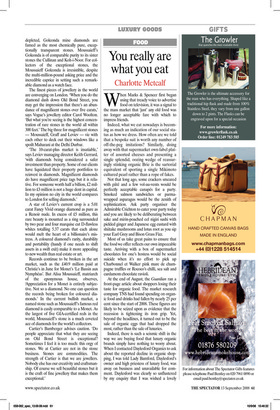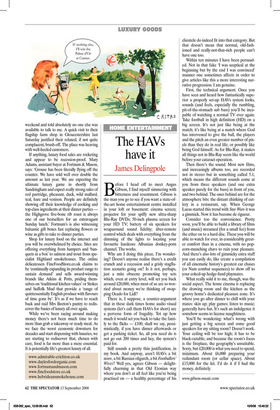You really are what you eat
Charlotte Metcalf
When Marks & Spencer first began using that treacly voice to advertise food on television, it was a signal to the mass market that ‘just’ any old food was no longer acceptable fare with which to impress friends.
Indeed, what we eat nowadays is becoming as much an indication of our social status as how we dress. How often are we told that a bespoke suit is worth any number of off-the-peg imitations? Similarly, doing away with that supermarket own-label platter of assorted cheeses and presenting a single splendid, oozing wedge of reassuringly stinking organic Brie is the sartorial equivalent of sporting a single Mikimoto cultured pearl rather than a rope of fakes.
�
Not that long ago, some crackers smeared with pâté and a few vol-au-vents would be
�
perfectly acceptable canapés for a party. Smoked salmon sandwiches or parmawrapped asparagus would be the zenith of sophistication. Ask party organiser the Admirable Crichton to cater your party today and you are likely to be deliberating between
��
sake and mirin-poached eel nigiri sushi with pickled ginger and Japanese egg custard with
���
shiitake mushrooms and lotus root as you sip your Earl Grey and Bison Grass Fizz.
Most of us take great pains to ensure that the food we offer reflects our own impeccable taste. Arriving with a box of supermarket chocolates for one’s hostess would be social suicide when it’s no effort to pick up Charbonnel et Walker pink marc de champagne truffles or Rococo’s chilli, sea salt and
Chapm
cardamom chocolate ravioli.
At the end of August, the Guardian ran a front-page article about shoppers losing their taste for organic food. The market research company TNS had found spending on organic food and drinks had fallen by nearly 25 per cent since the start of 2008. These figures are likely to be seized upon as evidence that the recession is tightening its iron grip. Yet, beyond the headlines, it turned out to be the sale of organic eggs that had dropped the most, rather than the sale of luxuries.
Indeed, there is such a seismic shift in the way we are buying food that luxury organic brands simply have nothing to worry about. When I contacted Daylesford Organics to ask about the reported decline in organic shopping, I was told Lady Bamford, Daylesford’s owner and high priestess of luxury food, was away on business and unavailable for comment. Daylesford was clearly so unflustered by my enquiry that I was wished a lovely weekend and told absolutely no one else was available to talk to me. A quick visit to their flagship farm shop in Gloucestershire last Saturday justified their relaxed, if not quite complacent, brush-off. The place was heaving with well-heeled customers.
If anything, luxury food sales are rocketing and appear to be recession-proof. Mary Adams, assistant buyer at Fortnum & Mason, says: ‘Grouse has been literally flying off the counter. We have sold well over double the amount as last year. We are expecting the ultimate luxury game in shortly from Sandringham and expect really strong sales of red partridge, pheasant, duck, wild mallard, teal, hare and venison. People are definitely showing off their knowledge of cooking and top-class ingredients at their dinner parties — the Highgrove five-bone rib roast is always one of our bestsellers for an extravagant Sunday lunch.’ Fortnum’s is also witnessing balsamic gift boxes fast replacing flowers or wine as gifts to take to dinner parties.
Shop for luxury food on the internet and you will be overwhelmed by choice. Sites are offering everything from hampers and ‘banquets in a box’ to salmon and trout from specialist Highland smokehouses. The online delicatessen FineFoodStore.co.uk claims to be ‘continually expanding its product range to sustain demand’ and sells award-winning brands like Atkins & Potts, priding themselves on ‘traditional kitchen values’ or Stokes and Suffolk Mud that provide a ‘range of quintessentially English produce with flavours of time gone by’. It’s as if we have to reach back and raid Mrs Beeton’s pantry to rediscover the basics of luxury all over again.
While we’ve been racing around making money there’s not been much time to do more than grab a takeaway or ready meal. As we face the worst economic downturn for decades and start dispensing with luxuries, we are starting to rediscover that, chosen with care, food is far more than a mere essential. It is potentially life’s greatest luxury of all.











































































 Previous page
Previous page